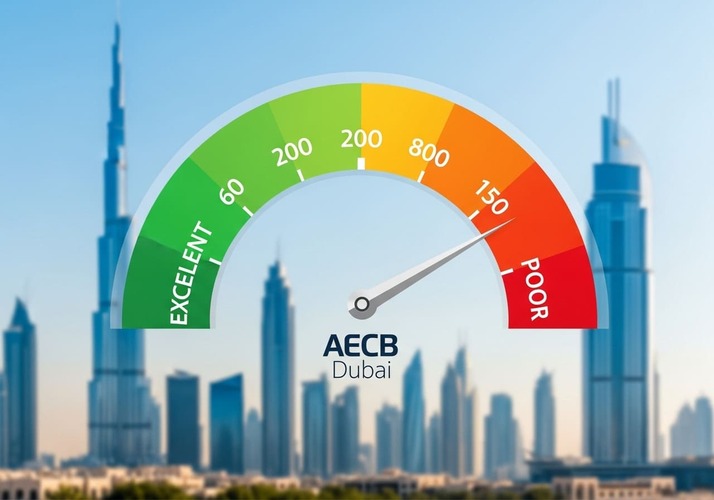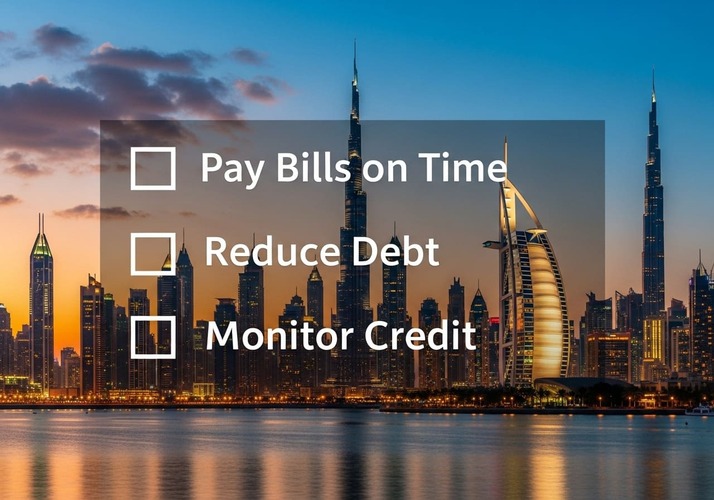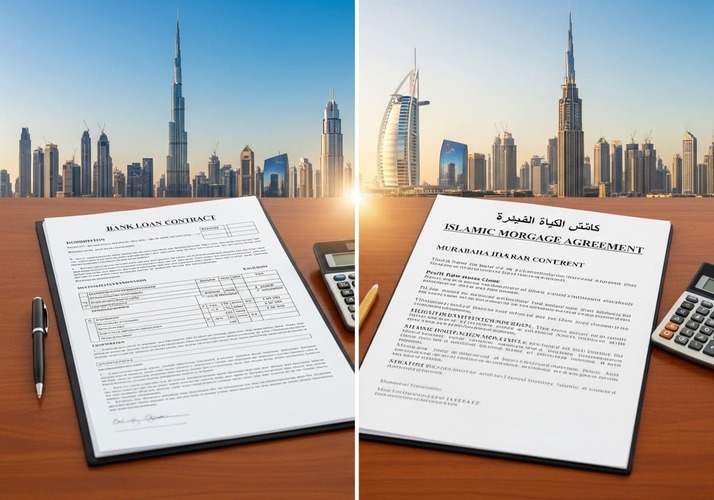Your credit score in Dubai, issued by Al Etihad Credit Bureau (AECB), directly impacts your ability to get mortgage approval, interest rates, and even rental contracts. A score above 700+ is ideal for property buying, while anything below 600 limits financing options.
Why Your Credit Score Matters in Dubai Real Estate
In Dubai’s fast-growing real estate market, securing a home loan or mortgage isn’t just about income—it’s about your credit score. Banks, landlords, and even developers rely on the Al Etihad Credit Bureau (AECB) score to evaluate financial reliability. For expats and investors, a strong score can mean lower interest rates, faster approvals, and access to premium property deals.
If you’re eyeing your dream apartment in Downtown Dubai or a luxury villa in Palm Jumeirah, your UAE credit score may decide how close you get to the keys.
What is a Credit Score in Dubai?

A credit score in Dubai is a three-digit number (300–900) issued by the Al Etihad Credit Bureau (AECB). It reflects your financial history, payment habits, and overall creditworthiness.
How it’s calculated:
- Payment History (35%) – Do you pay loans & credit cards on time?
- Credit Utilization (30%) – How much of your available credit do you use?
- Credit History Length (15%) – Longer history = better score.
- New Credit & Inquiries (10%) – Frequent applications lower score.
- Credit Mix (10%) – Having different accounts (credit cards, loans) helps.
Scores above 700 are considered strong in Dubai.
Why Your Credit Score Matters in Property Buying
In Dubai’s real estate ecosystem, your credit score acts like a financial passport. Here’s how it shapes your journey:
1. Mortgage Approvals
- Banks in Dubai require a minimum AECB score for mortgage eligibility.
- A higher score boosts your approval chances and reduces document scrutiny.
2. Loan Interest Rates
- Excellent score (750+) = lower profit rates.
- Average score (650–700) = moderate rates.
- Poor score (<600) = likely rejection or higher costs.
3. Rental Agreements
Many landlords in Dubai, especially in luxury areas, request credit reports before signing tenancy contracts. A good score reassures them of timely rent payments.
Minimum Credit Score Needed to Buy Property in Dubai
Here’s a quick benchmark guide for expats and investors:
- 750+ (Excellent): Best mortgage deals, high approval chances, flexible terms.
- 700–749 (Good): Competitive rates, standard eligibility.
- 650–699 (Fair): Approval possible, but with higher rates or lower loan-to-value (LTV).
- 600–649 (Poor): Limited bank options; may need higher down payment.
- Below 600 (Very Poor): High rejection rate. Need to rebuild before applying.
Example: To buy a 2-bedroom flat in Dubai Marina worth AED 1.5M, a buyer with a 750 score may get a 3.5% rate, while a 620 score could face 5.5%+.
How Expats Can Improve Their Credit Score Before Investing

If you’re planning to invest in Dubai property, start building your financial profile early.
Quick Tips to Boost Credit Score in UAE:
- Pay Bills on Time – Credit cards, utilities, and loans.
- Keep Credit Utilization Below 30% – Don’t max out cards.
- Avoid Frequent Loan Applications – Too many inquiries lower your score.
- Maintain Old Accounts – A longer credit history works in your favor.
- Monitor AECB Reports – Correct errors and track progress.
Pro Tip: Improving your score by even 50 points can save thousands in mortgage payments.
Credit Score & Mortgages in Dubai

How does AECB score impact mortgage eligibility?
- Above 700: Banks like Emirates NBD, Mashreq, and ADIB offer favorable mortgages.
- Below 650: You may need a higher down payment (25–35%).
Other impacts:
- Debt Burden Ratio (DBR): UAE law caps your debt obligations at 50% of your income.
- Property Type: Better scores allow you to finance both ready & off-plan properties.
Example: If you’re buying an off-plan property in Dubai Creek Harbour, banks may require a 20–25% down payment. But with a high credit score, you can negotiate lower upfront costs.
Islamic Mortgages & Credit Score

For those seeking Sharia-compliant home loans in UAE, credit score still matters. Banks offering Murabaha mortgage Dubai or Ijara mortgage UAE evaluate your AECB rating before approving financing.
High scores = better eligibility for Halal mortgage Dubai products.
Credit Score vs Real Estate Investment Decisions
For global investors, credit score also shapes:
- Access to multiple properties – financing one after another.
- Eligibility for Golden Visa through property purchase.
- Attractiveness to co-investors in joint ventures.
Secure Your Buying Power with Splendor
Your credit score in Dubai is more than a number—it’s the foundation of your property buying journey. From mortgage approvals to rental agreements, it influences how smoothly you can enter Dubai’s thriving real estate market.
Whether you want to buy an apartment in Downtown Dubai, a villa renovation project, or explore off-plan properties, preparing your credit profile is the first step.
Need help finding the right property and mortgage plan? Contact Splendor.ae today—your trusted real estate partner in Dubai.
FAQs
1. What is a good credit score in Dubai for buying property?
In Dubai, a credit score above 700 is generally considered good for property buying. Scores above 750 give access to the best mortgage rates, while anything between 650–699 may still qualify but with higher profit rates or stricter terms. A score below 600 makes financing difficult, requiring higher down payments or alternative options.
2. What is the minimum credit score needed for a mortgage in Dubai?
Most banks in Dubai require a minimum AECB credit score of 650 for mortgage approval. A score above 700 increases your chances of approval and better loan-to-value ratios. Expats with lower scores may face rejection or need to provide larger down payments of 25–35%.
3. How does credit score affect mortgage approval in Dubai?
Your UAE credit score directly influences mortgage approval, loan amounts, and interest rates. High scores (700+) result in faster approvals, lower profit rates, and higher financing eligibility. Low scores (below 650) can limit access to lenders, increase costs, or reduce the percentage of property financing available.
4. Does my credit score affect renting an apartment in Dubai?
Yes. Many landlords in Dubai, especially in premium areas like Downtown or Dubai Marina, request an AECB credit report before renting out apartments. A strong credit score reassures them that tenants can pay rent on time, while a weak score may require higher deposits or lead to rejections.
5. How is a credit score calculated in the UAE?
The Al Etihad Credit Bureau (AECB) calculates UAE credit scores between 300–900. Factors include:
- Payment history (on-time payments)
- Credit utilization (debt vs. limit)
- Credit history length
- Number of applications/inquiries
- Credit mix (loans, cards, mortgages)
A healthy mix with timely payments builds a stronger score.
6. Can expats improve their credit score before buying property in Dubai?
Yes. Expats can improve their credit score by:
- Paying all bills and credit cards on time
- Keeping utilization below 30%
- Avoiding multiple loan applications
- Maintaining old credit accounts
- Monitoring their AECB report for errors
These steps can raise scores quickly and increase mortgage eligibility.
7. How does credit score affect mortgage interest rates in Dubai?
A higher credit score lowers your mortgage profit rate. For example, buyers with a score of 750+ may secure rates around 3.5%, while those with 620 could face 5.5% or higher. The difference can cost thousands of dirhams over the loan term, making a good score essential for savings.
8. Is credit score important for Islamic mortgages in Dubai?
Yes. Even for Sharia-compliant home loans like Murabaha or Ijara, banks check your AECB credit score. A higher score increases approval chances and allows better terms. While Islamic mortgages avoid interest (Riba), they still assess repayment reliability before financing.
9. How can I check my credit score in Dubai?
You can check your UAE credit score by registering with the Al Etihad Credit Bureau (AECB) online or via their mobile app. The report provides your score, payment history, and outstanding debts. Fees apply (around AED 105–210), but having this report is vital before applying for mortgages or loans.
10. Can I buy property in Dubai with a low credit score?
Yes, but it’s challenging. With a credit score below 650, mortgage approvals are limited, and banks may demand higher down payments (25–35%). Some buyers opt for off-plan properties with developer financing or pay in cash. Improving your score before applying is the best strategy for affordability.




